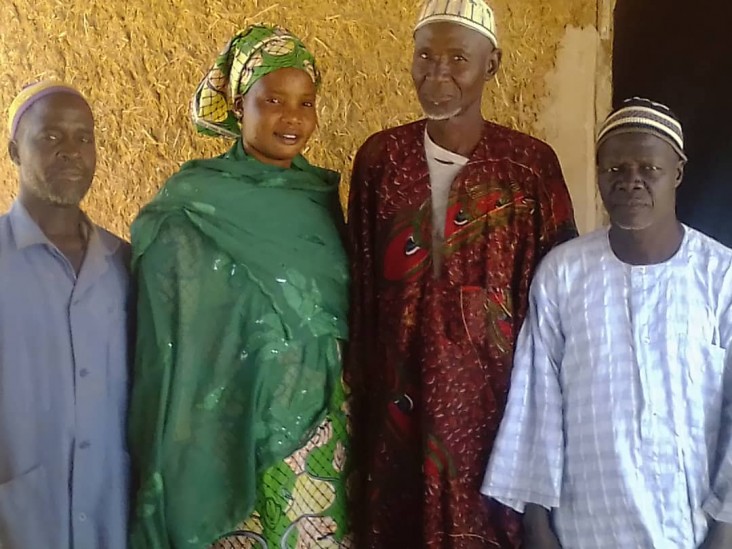Speeches Shim

Community health workers bring health care closer to the community and greatly contribute to reducing maternal and child deaths.
Saboucire n’di—a village of 811 people—is located eight kilometers from the Khoulon health center in the Kayes health district of Mali. Saboucire n’di is home to a community health worker (CHW), Ramatoulaye Diallo, selected by the district health team and trained by the government of Mali and partners, including USAID, to bring health services closer to this community.
Ramatoulaye, a mother of three, is a trained nurse. Since 2012, she has served the community of Saboucire n’di as its CHW. She has undertaken initiatives that led to positive results that the whole community recognizes. She successfully integrated into the community by participating in the village women’s group meetings. In fact, Ramatoulaye began educational talks on common childhood illnesses such as: malaria, respiratory infections and diarrhea. She also discussed with community on Malaria prevention methods, symptoms of illness and the treatment she could provide right in the community. She usually tailors her talks to topics pertinent to the season: malaria and diarrheal diseases during the rainy season; pneumonia during the dry and dusty times. Throughout the year, she promotes immunizations, nutrition practices and offers family planning methods.
“For six years, we have not dug graves for children under five years. The village became very clean. Our women go to the health center for antenatal care.” - Moussa Coulibaly, a village notable
Over time, the number of community members attending her education sessions increased. With the support of Aboubacar Diallo, community advisor of AMADECOM—a local Non-Governmental Organization working on the USAID-funded High Impact Health Services Project—she divided the village into four zones and developed a timetable for her activities. From Tuesday to Thursday, Ramatoulaye visits each zone for educational talks and conducts home visits. Specific talks with men are held under a large tree on Mondays on topics such as: birth planning, supporting women in antenatal care and transportation, the benefits of family planning and immunizations. While on Saturday, she collaborates with the village youth to clean the village.
These activities had a positive impact in the village. “For six years, we have not dug graves for children under five years and the village became very clean. Our women go regularly to the health center for antenatal care. Moreover, since we started to strictly follow the CHW advice, we have seen a lot of things change for the better.” explains Moussa Coulibaly, a village notable.
Ramatoulaye herself confirmed with pride, “Since I arrived in this village in 2012, no child has died. I have made it my job to visit all households to identify sick children. I tell mothers and fathers to bring the children who do not feel good to me for care. Parents don’t wait. I also follow-up with all pregnant women in the village to make sure they complete their antenatal care consultations.”
Ramatoulaye is well integrated into the community and has their support. Community has built her a house and a separate building to conduct consultations. The USAID/ High Impact Health Services Project supports more than 1,150 CHWs like Ramatoulaye in the regions of Kayes, Koulikoro, and Sikasso to provide a full package of preventive and curative care of childhood illnesses, nutrition and hygiene promotion as well as acute malnutrition management. CHWs, like Ramatoulaye, also provide short-term family planning methods and refer women for long-acting methods. There is a heavy emphasis on danger signs, their recognition, and appropriate and timely care-seeking. The project’s support includes training, supervision, provision of data collection and reporting tools as well as payment of a monthly incentive to the CHWs. This 5-years project of 46 million aims to reduce or eliminate maternal, newborn, and child deaths in Mali.

Comment
Make a general inquiry or suggest an improvement.